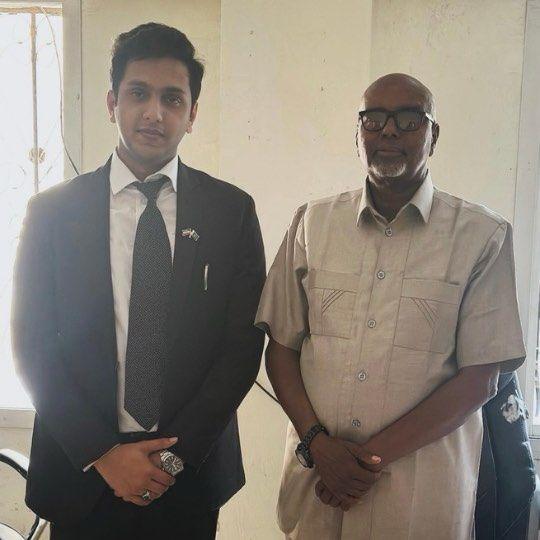Executive Summary
This report documents the massacre of civilians and the illegal detention and killing of peace delegates in Da’awalay, Harshin District, Somali Regional State, Ethiopia, on December 25, 2024. The attack, carried out by the Liyuu Police—a paramilitary force under the Somali Regional State government led by President Mustafe Cagjar—resulted in the deaths of hundreds of civilians, including peace delegates, elders, and community leaders. Many others were injured. In addition to the loss of lives, the attackers set homes ablaze, causing widespread displacement and leaving countless families without shelter or basic necessities.
This atrocity constitutes a blatant violation of international human rights law and the Ethiopian constitution, specifically regarding the right to life, protection from violence, and the safeguarding of civilian property. Immediate humanitarian intervention is critical. The international community, including the United Nations and other humanitarian organizations, must take swift action to support the victims and ensure justice is served.
Background
Location: Da’awalay, Harshin District, Somali Regional State, Ethiopia
Population: Predominantly inhabited by the Isaq subclan Arab, a community with a long-standing history of peaceful coexistence and involvement in reconciliation efforts within the region.
The Somali Regional State has been plagued by ongoing ethnic and political tensions, often intensified by the actions of the Liyuu Police. This paramilitary force is notorious for human rights violations, including extrajudicial killings, arbitrary detentions, and the destruction of civilian property. The Da’awalay attack occurred during a peace delegation meeting, underscoring the targeted nature of the violence aimed at undermining regional reconciliation efforts.
Incident Overview
Timeline of Events:
Early Morning, December 25, 2024: Liyuu Police forces stormed Da’awalay during a peace meeting aimed at de-escalating local tensions.
Indiscriminate Violence: Eyewitness accounts confirm that the paramilitary forces opened fire without warning, targeting men, women, and children. Several peace delegates were executed after being detained.
Destruction of Property: Homes were deliberately set ablaze, causing mass displacement and widespread destruction.
Casualties and Damage:
Deaths:Hundreds of civilians, including peace delegates and community elders, were killed.
Injuries: Numerous individuals sustained injuries, including gunshot wounds and burns, many of whom require immediate medical attention.
Displacement: Thousands have been displaced, with entire neighborhoods reduced to ashes. Families are now facing severe humanitarian challenges.
Methods Used:
Weapons: Firearms, heavy weaponry, and other military-grade equipment.
Tactics: Summary executions, indiscriminate gunfire, and targeted arson were employed to instill fear and terrorize the population.
Evidence and Testimonies
Eyewitness Accounts:
Survivors recount harrowing details of the attack. One anonymous survivor stated:
“The Liyuu Police stormed the peace meeting and opened fire without warning. They killed everyone in their path and burned our homes, leaving us with nothing. It was a massacre.”
Visual Evidence:
Photographic and video materials show burned homes, charred bodies, and the aftermath of the attack. These have been submitted to international human rights organizations for verification.
Independent Reports:
Human rights organizations, including Amnesty International and Human Rights Watch, have corroborated accounts of targeted violence and excessive force. Both organizations are conducting further investigations.
Accountability and Responsibility
Perpetrators:
Senior officers of the Liyuu Police, including Commander Gafaydhe, are directly implicated. The attack appears to have been executed under the directives of Somali Regional State President Mustafe Cagjar, suggesting complicity at the highest levels of regional governance.
Chain of Command:
Operating under the Somali Regional State government, the Liyuu Police has acted with impunity, disregarding human rights and constitutional protections for civilians.
Humanitarian Impact
Displacement:
Thousands of residents have been displaced, now lacking access to shelter, food, and clean water. Many have fled to remote areas, facing harsh conditions.
Immediate Needs:
Shelter: Temporary accommodations are urgently needed for displaced families.
Healthcare: Medical services are critical for those with gunshot wounds, burns, and psychological trauma.
Food and Water: Access to essential supplies is dire for affected communities.
Psychosocial Support: Trauma counseling is vital, particularly for women and children who have witnessed or experienced violence.
Legal Implications
This attack represents a severe violation of:
International Law:
Article 6 (Right to Life) and Article 7 (Prohibition of Torture) of the International Covenant on Civil and Political Rights.
Protections under the Geneva Conventions for civilian life and property.
Ethiopian Constitutional Rights:
Provisions safeguarding individuals from unlawful violence and arbitrary detention.
Call to Action
The gravity of this atrocity demands urgent international and national intervention:
1. Immediate Humanitarian Assistance:
Deployment of aid to provide shelter, medical care, and essential supplies for survivors.
2. Independent Investigation:
A thorough inquiry into the massacre, with international oversight, to ensure accountability.
3. Accountability:
Prosecution of those responsible, including high-ranking officials in the Somali Regional State government.
4. Preventive Measures:
Reforms to curb the unchecked power of the Liyuu Police and prevent further atrocities.
Conclusion
The Da’awalay massacre on December 25, 2024, marks a horrifying escalation in the region’s ongoing crises. The deliberate targeting of civilians and peace delegates by state security forces constitutes a war crime. Immediate action is essential to support the survivors, hold perpetrators accountable, and prevent further violence. The international community must stand united in demanding justice and ensuring the protection of human rights in the Somali Regional State of Ethiopia.





